Struggling to find truly sustainable packaging? You want options that are good for the planet but still practical. It’s a common headache for many businesses I talk to.
Washable paper bags offer a reusable, durable, and often biodegradable alternative to single-use bags. Although they resemble traditional paper, they are actually made from specially treated fiber materials designed to withstand washing, making them an eco-friendlier choice for many applications.
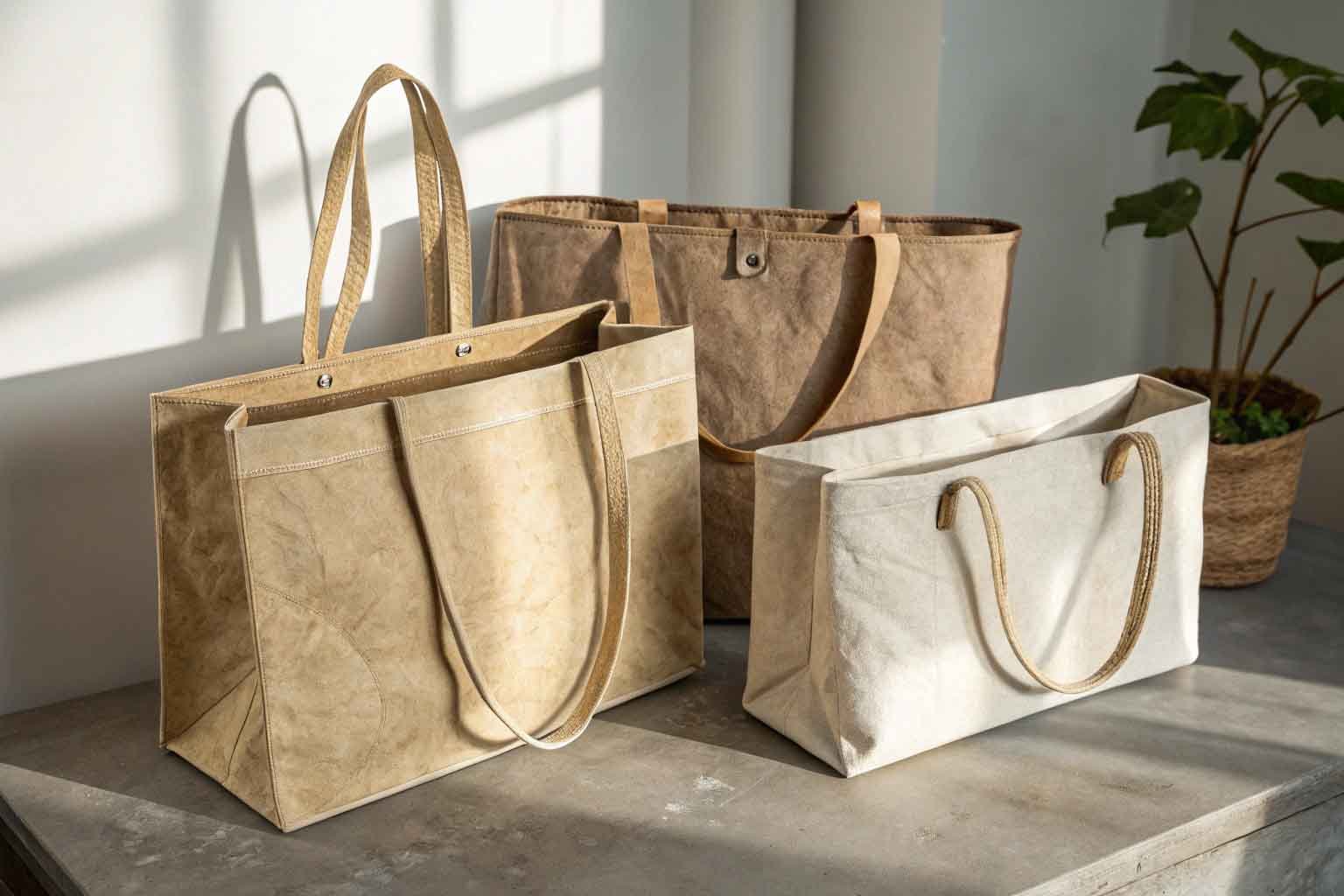
These bags sound interesting, don’t they? I’ve seen a real surge in interest for them. But like any material, it’s important to understand them fully before deciding if they fit your brand’s needs. Let’s explore what makes them tick and if they truly live up to the hype.
What Is a Washable Paper Bag? Understanding the Basics?
Finding a bag that lasts can be tough. You need something strong, but what if it gets dirty? Regular paper just won’t cut it for long-term use.
Washable paper bags are made from a special kind of paper, often natural cellulose fibers or kraft paper with special treatments. This allows them to be washed and reused multiple times.
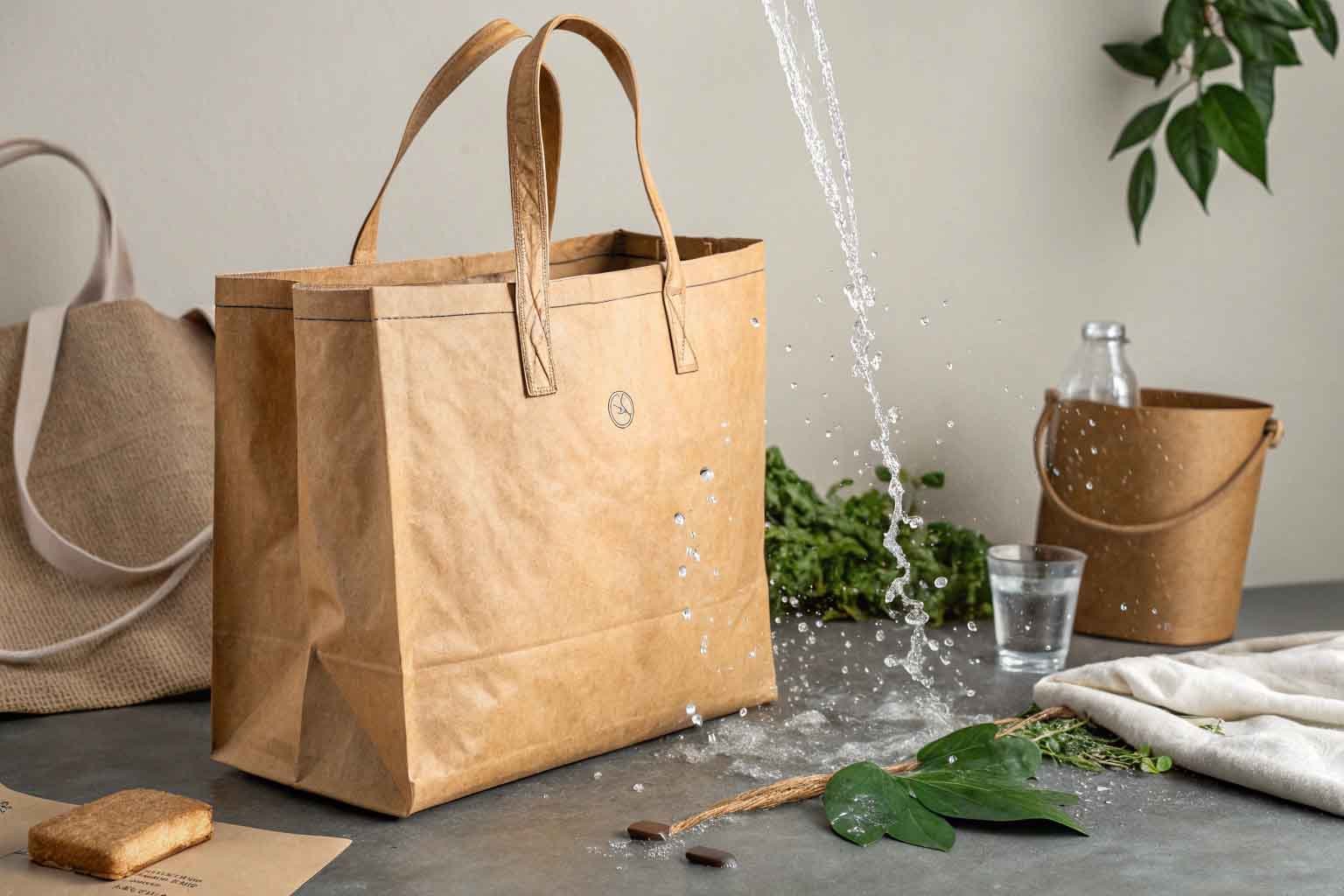
![]()
When I first encountered washable paper, I was skeptical. Paper that you can wash? It sounded like a gimmick. But after handling samples and even running a few through my own gentle wash cycles, I understood.
The material is surprisingly resilient. It’s usually crafted from cellulose fibers1, which are plant-based, or specially treated kraft paper. Some even incorporate materials like DuPont Tyvek2, though many focus on more natural fiber compositions. The key is that they are designed to be cleaned. You can typically wash them 5 to 10 times. I recommend a gentle cycle with cold water and mild detergent. Then, just air dry them, as high heat can damage the coating or fibers.
Over time, they might get a softer, more crinkled look – which I actually find quite charming – but they remain functional. It’s a far cry from the single-use paper bags we’re all used to.
Key Advantages of Washable Paper Bags for Everyday Use?
You want bags that are eco-friendly, but they also need to be strong and look good. Finding that perfect balance can feel like searching for a unicorn sometimes.
Washable paper bags are durable, eco-conscious, and stylish. They offer reusability, can carry significant weight, and often come from vegan and cruelty-free sources, looking good while doing good.
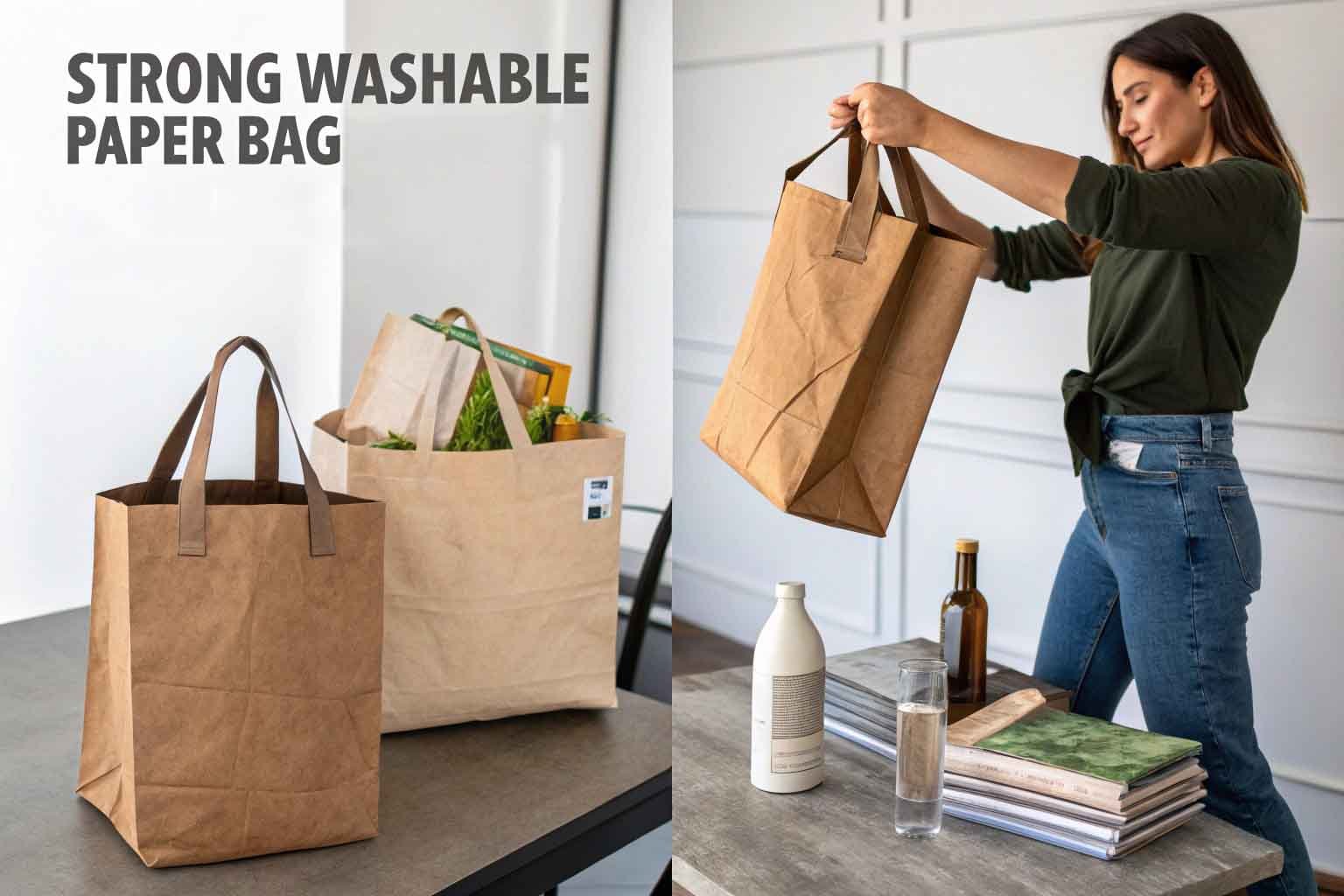
The benefits of sacs en papier lavables are quite compelling, especially when I talk to clients deeply committed to sustainability. Their reusability is a central value. I’ve seen these bags impress many brand owners. Let’s lay out the main plus points:
| Avantage | Description |
|---|---|
| Eco-Friendlier | Often biodegradable and made from renewable, natural resources, reducing reliance on single-use plastics. |
| Durabilité | Surprisingly tough, capable of carrying significant loads (e.g., 15-25 pounds) without tearing easily. |
| Réutilisation | Designed to be washed and reused multiple times (typically 5-10+), extending their lifespan significantly. |
| Aesthetics | Lightweight, often with a chic, premium, almost leather-like or fabric-like appearance. |
| Ethical Sourcing | Many options are made from cruelty-free and vegan materials, appealing to conscious consumers. |
This combination of features makes them very attractive for retail, gifting, or promotional items. I remember a client who used them for a high-end organic food store, and their customers loved the bags as much as the products, praising their unique feel and reusability.
Common Drawbacks: Limitations You Should Know Before Buying?
These bags sound great, but what’s the catch? No product is perfect, and it’s easy to get swayed by benefits without considering potential downsides or hidden costs.
The main drawbacks include a higher initial cost compared to disposable bags, and while water-resistant, they are not fully waterproof. Production can also be resource-intensive.
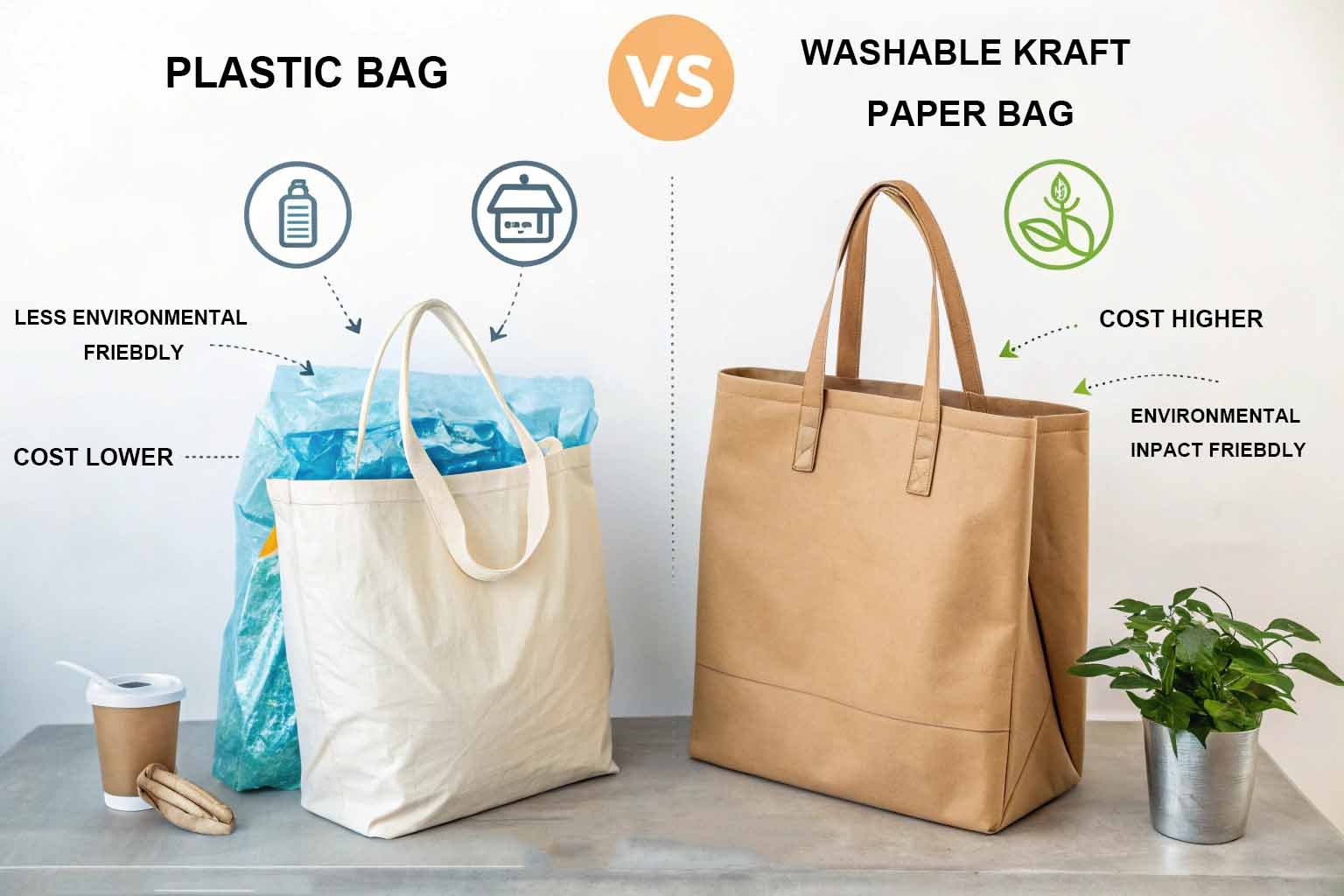
It’s important to have a balanced view, so let’s discuss the limitations. Every material choice has trade-offs. Before committing, consider these points:
| Drawback | Description |
|---|---|
| Higher Initial Cost | Generally more expensive upfront ($5-$15+ per bag) than traditional single-use paper or plastic bags. |
| Not Fully Waterproof | Water-resistant, but prolonged soaking can compromise material integrity. Not ideal for very wet items. |
| Production Impact | Manufacturing any paper product, even reinforced types, can require significant water and energy. |
| Long-Term Durability | While robust, may not last as long as heavy-duty canvas with extremely frequent, rugged use. |
| Storage Considerations | Might not fold down as compactly as thin plastic bags, which can be a minor issue for some users. |
I always advise clients to weigh the higher initial cost against the long-term value from reusability and enhanced brand image. Understanding these potential issues helps ensure they are the right fit for your specific needs and that you can manage customer expectations if, for instance, ultimate waterproofing is required.
Washable Paper Bag vs Traditional Paper and Plastic Bags?
Choosing between so many bag types is confusing. You need to know how washable paper really stacks up against the everyday options we’re all familiar with.
Washable paper bags are more durable and reusable than traditional paper, and far more eco-friendly in an end-of-life sense than plastic. However, they cost more initially.
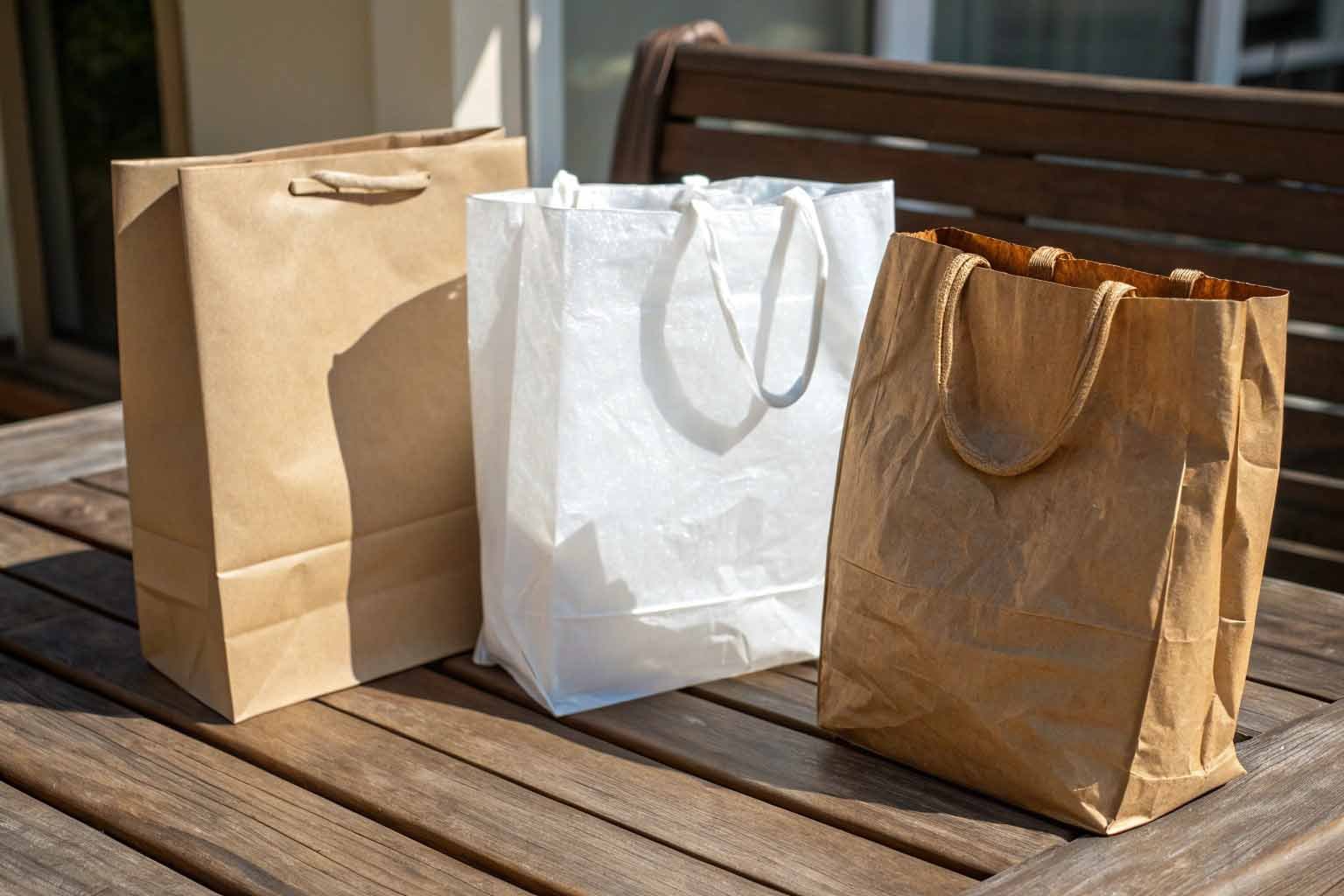
When I’m advising a client, the comparison often comes down to lifecycle and immediate use. Let’s break it down:
| Fonctionnalité | Washable Paper Bag | Traditional Paper Bag | Plastic Bag (Single-Use) |
|---|---|---|---|
| Durabilité | High, reusable, tear-resistant | Low, single or few uses | Varies, often low for thin bags |
| Réutilisation | High (washable 5-10+ times) | Very low to none | Low (designed for single use) |
| Eco-Impact | Better (often biodegradable, renewable) | Moderate (recyclable if clean) | Poor (fossil fuels, pollution) |
| Cost (Initial) | Plus élevé | Faible | Very Low |
| Résistance à l'eau | Good (resistant, not waterproof) | Poor (weakens when wet) | High (waterproof) |
| Aesthetics | Often premium, stylish | De base | Basic, functional |
Traditional paper bags are cheap but flimsy and offer little water resistance. Plastic bags, while waterproof and cheap, are an environmental disaster.
Washable paper bags offer a middle ground: much stronger and more sustainable than traditional paper, and a significantly better environmental profile3 than plastic due to their reusability and potential biodegradability. The initial investment is higher, but I often frame it as a cost per use, which can be quite favorable over time.
I had a small boutique owner switch from high-quality paper bags to washable ones for her premium items. While the upfront cost per bag was more, she found customers valued them, reused them, and it enhanced her brand’s eco-conscious image, ultimately justifying the expense.
Is Washable Paper a Good Tyvek Alternative?
You’ve heard of Tyvek for its strength and water resistance. Now you’re wondering if washable paper, especially the kraft paper kind, can compete as an eco-friendlier option.
Washable kraft paper can be a good, more natural-feeling alternative to Tyvek for many uses, offering similar durability and washability, though Tyvek (a synthetic) often has superior water resistance.
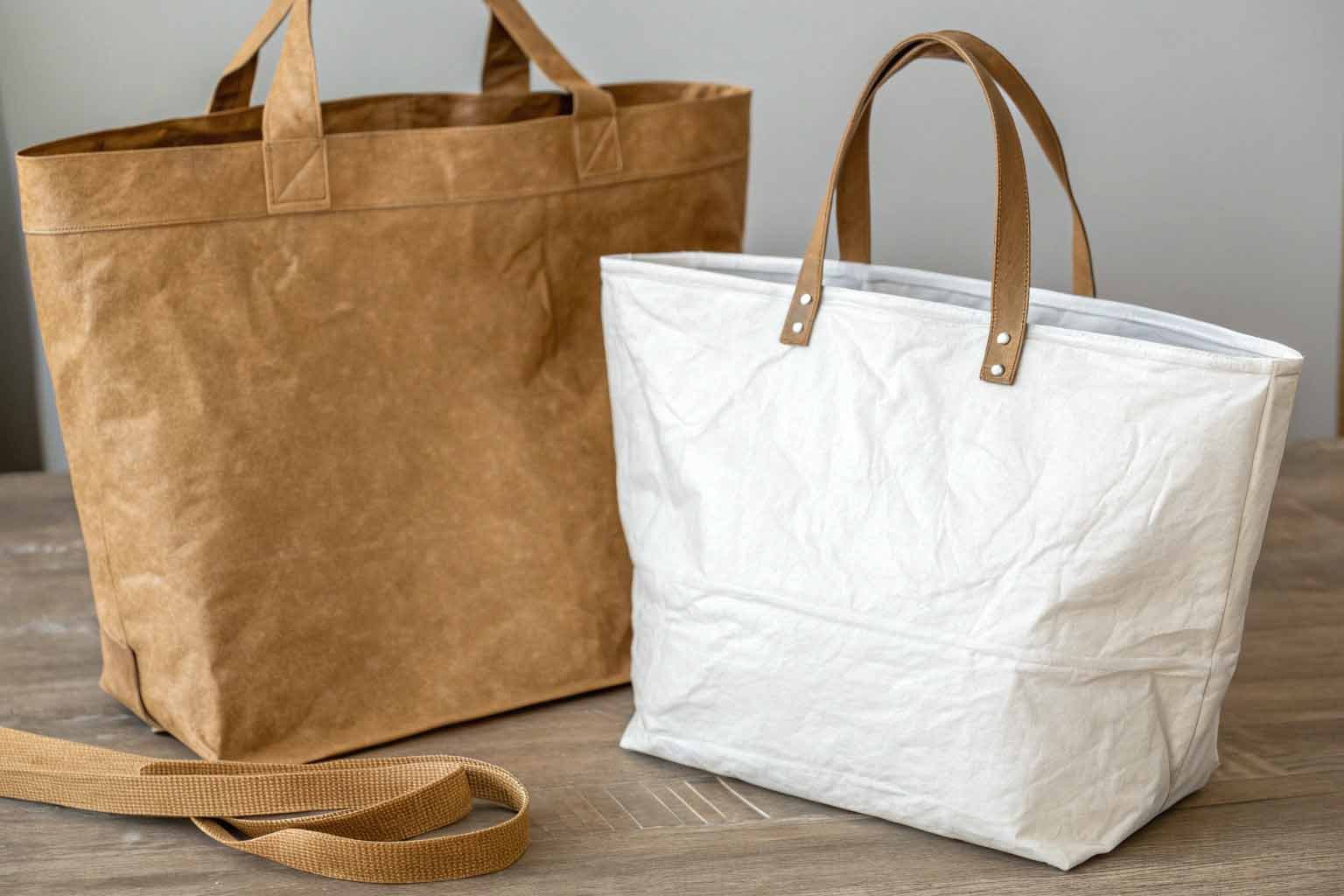
This is a great question I get, especially from businesses looking for robust yet sustainable options. Tyvek, made by DuPont, is a brand of flashspun high-density polyethylene fibers – essentially a synthetic material. It’s incredibly strong, lightweight, water-resistant, and tear-proof. It’s fantastic for many applications. Washable paper, particularly the kind made from natural kraft paper pulp that’s been treated for durability and washability, enters as a strong contender, especially if the "natural material" aspect is key for your brand.
Here’s a quick comparison:
| Fonctionnalité | Washable Kraft Paper | DuPont Tyvek |
|---|---|---|
| Matériau | Natural cellulose fibers (plant-based) | Synthetic (polyethylene) |
| Sentiment | Can age to a soft, leather-like texture | Paper-like, can be crinkly or smooth |
| Durabilité | Very good, tear-resistant | Excellent, very tear-resistant |
| Lavabilité | Yes | Yes |
| Résistance à l'eau | Good, but not fully waterproof | Excellent, highly water-resistant |
| Eco-Perception | Generally seen as more "natural" | Synthetic, but durable and recyclable |
| Imprimabilité | Bon | Excellent |
While Tyvek might have an edge in extreme water resistance and sheer tear strength, washable kraft paper offers a wonderful tactile experience and a stronger "natural" story.
I’ve worked with brands that specifically chose washable kraft paper over Tyvek because the slightly more organic look and feel aligned better with their earthy or artisanal products. If ultimate waterproofing isn’t the absolute top priority, but robust reusability and a natural aesthetic are, then washable kraft paper is definitely a fantastic alternative to consider.
Final Thoughts: Are Washable Paper Bags Truly Sustainable?
You need a clear answer: are these bags genuinely a step forward for the environment, or just another product with green claims that don’t fully hold up under scrutiny?
Washable paper bags are a significantly more sustainable option than single-use bags if reused consistently. Their overall impact depends on responsible sourcing, production, and proper end-of-life disposal.
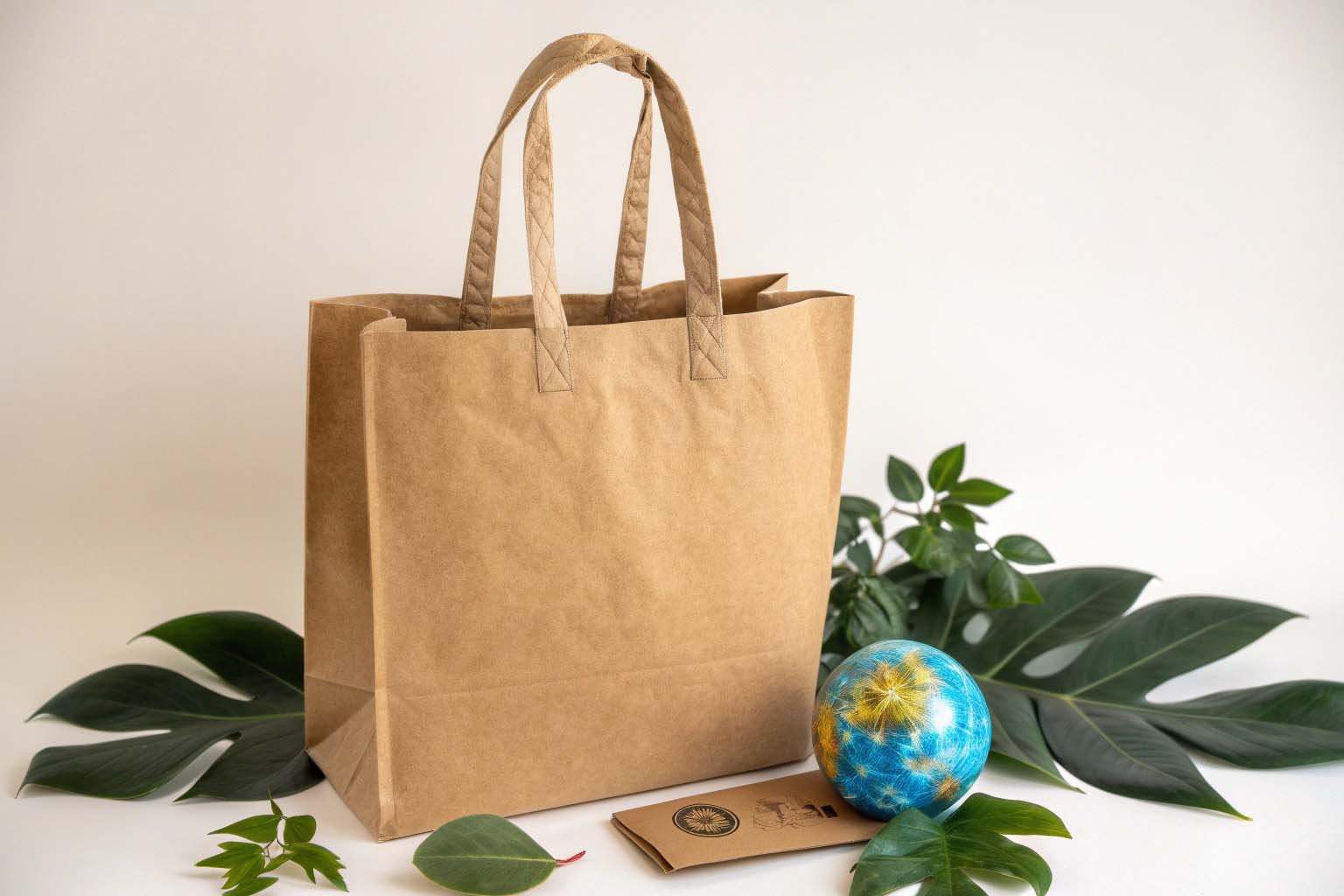
So, are washable paper bags the eco-friendly heroes we’re looking for? In my experience, they are a very good step in the right direction, especially when compared to single-use plastic or even standard paper bags. Their reusability is the biggest win. By choosing a bag that can be used 5, 10, or even more times, we dramatically reduce the demand for new single-use items. Many are made from renewable resources, and some are biodegradable under the right conditions.
However, “truly sustainable4” is a high bar. We must consider the resources used in their production – the water, energy, and any chemicals involved in treating the paper to make it washable. That’s why I always urge clients to ask suppliers tough questions about their manufacturing processes and certifications. Recycling can also be a challenge if the bags are heavily soiled or if local facilities can’t process coated papers.
Despite these considerations, if you encourage reuse and select bags from responsible manufacturers, they offer a far better environmental footprint than the alternatives. I’ve seen them make a real difference for businesses aiming to reduce waste.
Conclusion
Washable paper bags offer a durable, stylish, and more eco-conscious alternative to single-use options, though cost and production impact need consideration for true sustainability.
-
Explore this link to understand the properties and applications of cellulose fibers, which are crucial for sustainable materials. ↩
-
Learn about DuPont Tyvek, a versatile material used in various industries, enhancing your knowledge of modern materials. ↩
-
Learn how washable paper bags have a better environmental profile than plastic, making them a more sustainable choice. ↩
-
Understanding the concept of ‘truly sustainable’ can help you make informed choices about products and their environmental impact. ↩


